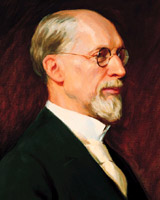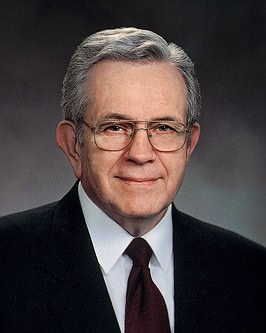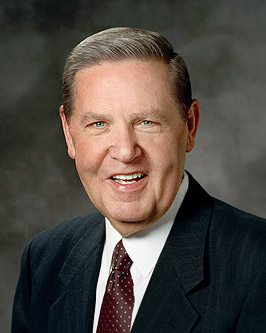Old Testament Lessons
SEARCH BY LIST
 May We So Conduct Our Lives
May We So Conduct Our Lives
We are considered by the world a peculiar people. By the unbeliever, the members of the Church of Christ in all ages of the world have been considered a peculiar people. When the Lord has spoken through His servants, there have been at different periods of time people in the earth who have said, “I do not believe in revelation.” This age is no exception to the rule. The thousands, aye, the millions, of our Father’s children who live in the earth are but repeating the history of the past when they deny that God has revealed again His will to the children of men, and say that they have no need of any further revelation. To demonstrate this we may refer to the experiences of the people in the days of Noah. Noah was a prophet of the living God, inspired with a desire to save the souls of the children of men. He had no disposition to destroy those who lived around him, but, receiving a commandment from our Father in heaven, he warned the people to repent of their evil ways, and declared that unless they did repent, destruction would follow and our Heavenly Father would visit them with His displeasure. What was the result? They said to Noah, “What right have you to instruct us? Who are you that you come and speak to us in the name of the Lord? You are only a man like other men.” And they rejected his testimony, not because it was untrue, but because they would not believe it, not possessing the spirit which he possessed. Then the Lord told him to build an ark, and to gather therein those who believed his message, and then He would visit His displeasure upon the inhabitants of the earth. It was not because Noah had said these things that the deluge came; it was because Almighty God had spoken through him to the people. When our Father in heaven speaks to the world, no matter how feeble or weak the servant may be who carries the message, that word will be vindicated, even if it involves the destruction of many souls. You no doubt remember the experience of Jonah when he was called to warn the people of Nineveh. Our Father in heaven commanded him to go and call them to repentance. He tried to avoid this responsibility, and it resulted in his being thrown into the ocean. But the same power that had called him to this mission preserved his life, and rebuked him for avoiding what was his plain duty. Then he went and warned the people of Nineveh, and they repented in sackcloth and ashes. You will remember the Lord promised that if they did not repent they would be punished; but they did repent, and He removed from them the curse that otherwise would have been visited upon them for the violation–of what? Not because they failed to listen to Jonah as a man, but because they failed to heed Jonah, the prophet of God, And when they did listen to the voice of the Lord through that inspired man, they received a blessing instead of a cursing.
 Meeting Your Goliath
Meeting Your Goliath
It was a Philistine who dared to challenge all others—a veritable giant of a man called Goliath of Gath. . . This champion from the Philistine camp stood and cried unto the armies of Israel: “Why are ye come out to set your battle in array? am not I a Philistine, and ye servants to Saul? choose you a man for you, and let him come down to me.” There was one, however, who did not quake with fear nor run in alarm. . . David, the shepherd boy, had spoken. But he did not speak just as a shepherd boy. For the hands of the prophet Samuel had rested upon his head and anointed him; and the Spirit of the Lord had come upon him. . . David prevailed over the Philistine with a sling and with a stone, and smote the Philistine, and slew him.” The battle had been fought. The victory had been won. David emerged a national hero, his destiny before him. Some of us remember David as a shepherd boy divinely commissioned by the Lord through the prophet Samuel. Others of us know him as a mighty warrior, for doesn’t the record show the chant of the adoring women following his many victorious battles, “Saul has slain his thousands, and David his ten thousands”? Or perhaps we look upon him as the inspired poet or as one of Israel’s greatest kings. Still others recall that he violated the laws of God and took Bathsheba, she who belonged to another. He even arranged the death of her husband Uriah. I like to think of David as the righteous lad who had the courage and the faith to face insurmountable odds when all others hesitated, and to redeem the name of Israel by facing that giant in his life—Goliath of Gath. Well might we look carefully into our own lives and judge our courage, our faith. Is there a Goliath in your life? Is there one in mine? Does he stand squarely between you and your desired happiness? Your Goliath may not carry a sword or hurl a verbal challenge of insult that all may hear and force you to decision. He may not be ten feet tall, but he likely will appear equally as formidable, and his silent challenge may shame and embarrass. . . Should there be a Goliath in our lives, or a giant called by any other name, we need not “flee” or be “sore afraid” as we go up to battle against him. Rather we can find assurance and receive divine help from Him of whom David wrote in his inspired psalm: “The Lord is my shepherd; I shall not want. … Yea, though I walk through the valley of shadow of death, I will fear no evil: for thou art with me.” Victory will be ours.
 Obedience Brings Blessings
Obedience Brings Blessings
A soul-stirring account of obedience is that of Abraham and Isaac. How painfully difficult it must have been for Abraham, in obedience to God’s command, to take his beloved Isaac into the land of Moriah to offer him as a sacrifice. Can we imagine the heaviness of Abraham’s heart as he journeyed to the appointed place? Surely anguish must have racked his body and tortured his mind as he bound Isaac, laid him on the altar, and took the knife to slay him. With unwavering faith and implicit trust in the Lord, he responded to the Lord’s command. How glorious was the pronouncement, and with what wondered welcome did it come: “Lay not thine hand upon the lad, neither do thou any thing unto him: for now I know that thou fearest God, seeing thou hast not withheld thy son, thine only son from me.” Abraham had been tried and tested, and for his faithfulness and obedience the Lord gave him this glorious promise: “In thy seed shall all the nations of the earth be blessed; because thou hast obeyed my voice.” Although we are not asked to prove our obedience in such a dramatic and heart-wrenching way, obedience is required of us as well.
 The Power of the Priesthood
The Power of the Priesthood
Gideon was chosen to lead the armies of Israel, thousands strong. But of them all, he chose only 300 men. Gideon had an interesting way of selecting his recruits. When the men drank water at a stream, most “bowed down … to drink.” Those he passed over. A few scooped up water in their hands and drank, remaining completely alert. They were the ones chosen. We live in a day of “wars [and] rumors of wars, and earthquakes in divers places.” As prophesied, “the whole earth [is] in commotion” and “Satan is abroad in the land.” He seeks to destroy all that is good and righteous. He is Lucifer, who was cast out of the presence of God. Against all of that, we have very positive feelings about what lies ahead. Gideon’s small force succeeded because, as the record states, “they stood every man in his place.” . . While the priesthood is presently all over the world, we call on every elder and high priest, every holder of the priesthood to stand, like Gideon’s small but powerful force of 300, in his own place. We now must awaken in every elder and high priest, in every quorum and group, and in the father of every home the power of the priesthood of the Almighty. The Lord said that “the weak things of the world shall come forth and break down the mighty and strong ones.”
 “Remember Lot’s Wife”
“Remember Lot’s Wife”
Let’s recall who Lot’s wife was. The original story, of course, comes to us out of the days of Sodom and Gomorrah, when the Lord, having had as much as He could stand of the worst that men and women could do, told Lot and his family to flee because those cities were about to be destroyed. . . In the time we have this morning, I am not going to talk to you about the sins of Sodom and Gomorrah, nor of the comparison the Lord Himself has made to those days and our own time. I am not even going to talk about obedience and disobedience. I just want to talk to you for a few minutes about looking back and looking ahead. . . Apparently what was wrong with Lot’s wife was that she wasn’t just looking back; in her heart she wanted to go back. It would appear that even before they were past the city limits, she was already missing what Sodom and Gomorrah had offered her. As Elder Maxwell once said, such people know they should have their primary residence in Zion, but they still hope to keep a summer cottage in Babylon. It is possible that Lot’s wife looked back with resentment toward the Lord for what He was asking her to leave behind. We certainly know that Laman and Lemuel were resentful when Lehi and his family were commanded to leave Jerusalem. So it isn’t just that she looked back; she looked back longingly. In short, her attachment to the past outweighed her confidence in the future. That, apparently, was at least part of her sin. So, as a new year starts and we try to benefit from a proper view of what has gone before, I plead with you not to dwell on days now gone, nor to yearn vainly for yesterdays, however good those yesterdays may have been. The past is to be learned from but not lived in. We look back to claim the embers from glowing experiences but not the ashes. And when we have learned what we need to learn and have brought with us the best that we have experienced, then we look ahead, we remember that faith is always pointed toward the future. Faith always has to do with blessings and truths and events that will yet be efficacious in our lives. So a more theological way to talk about Lot’s wife is to say that she did not have faith. She doubted the Lord’s ability to give her something better than she already had. Apparently she thought—fatally, as it turned out—that nothing that lay ahead could possibly be as good as those moments she was leaving behind.
